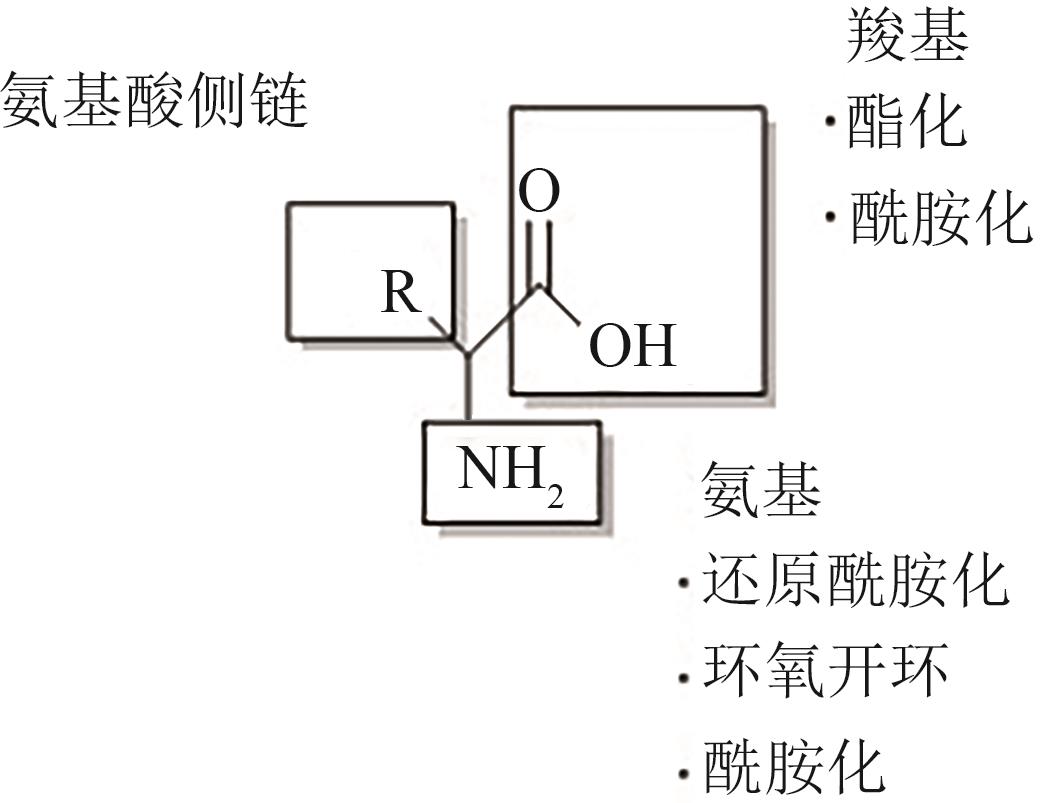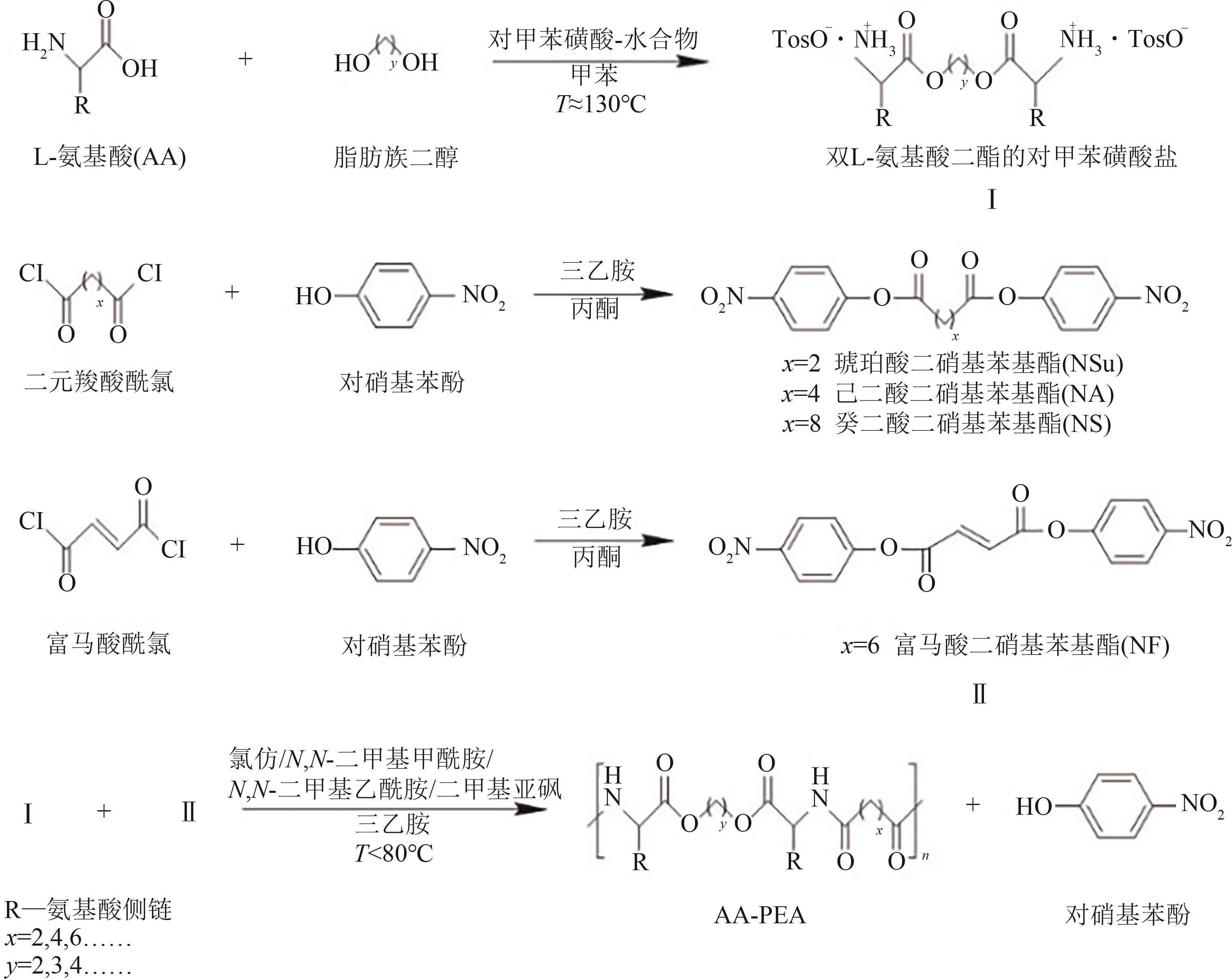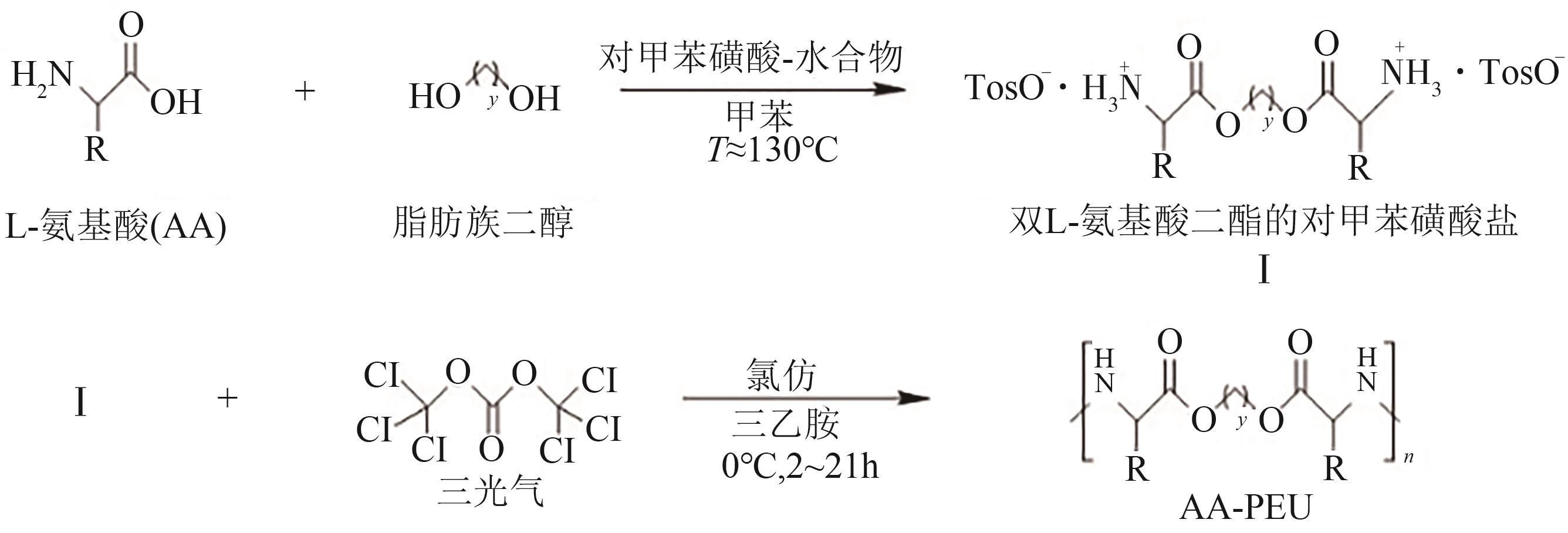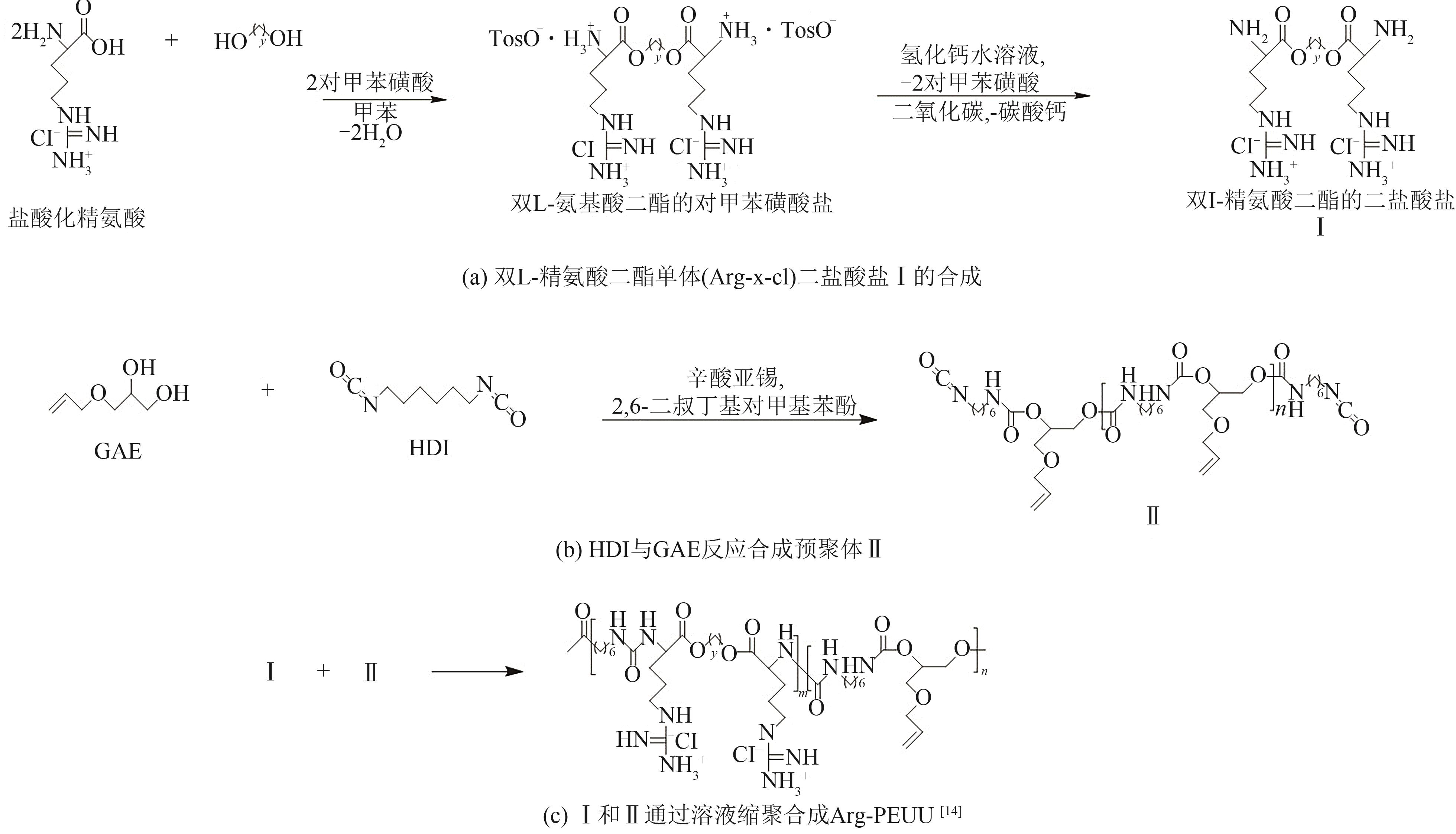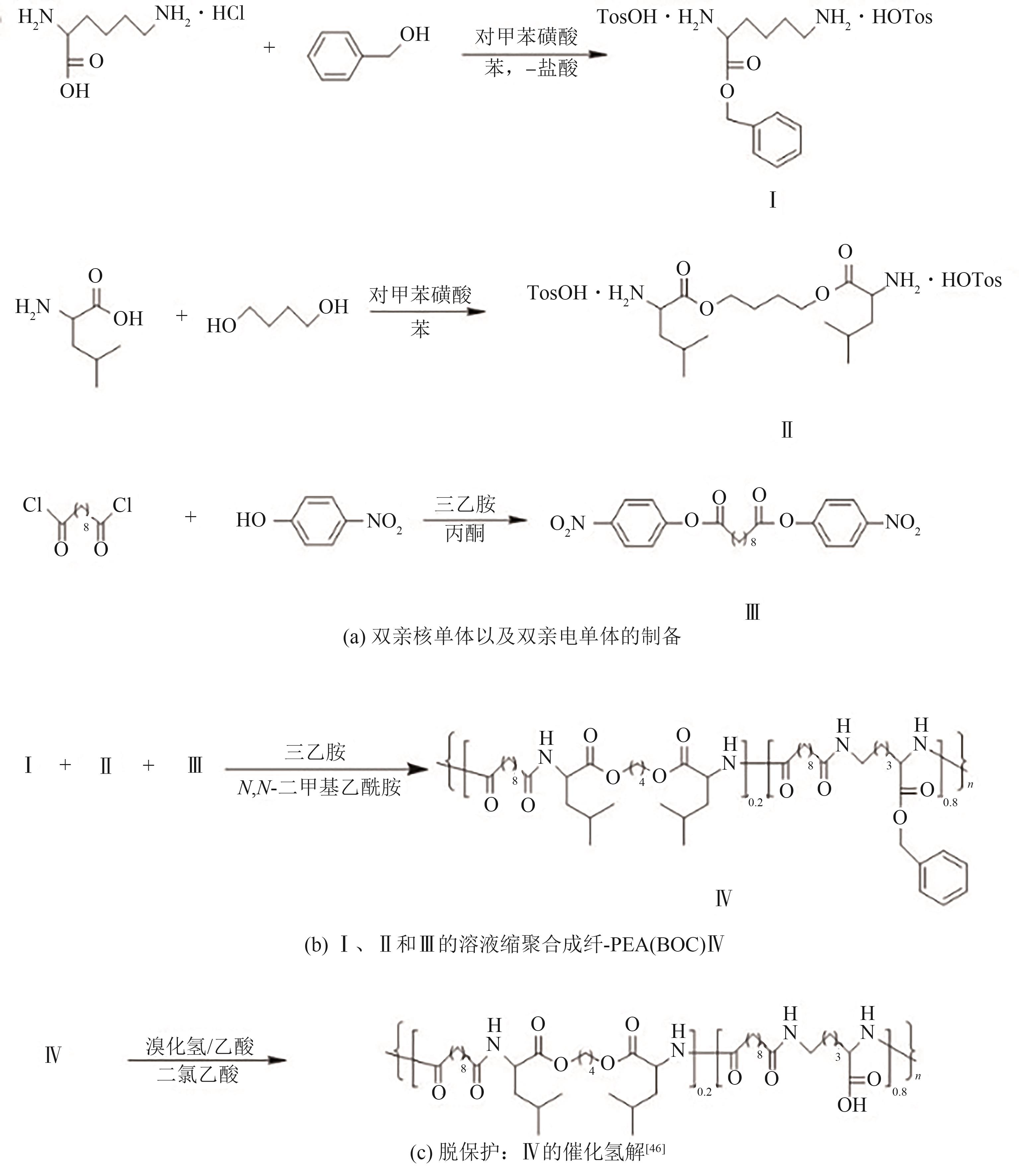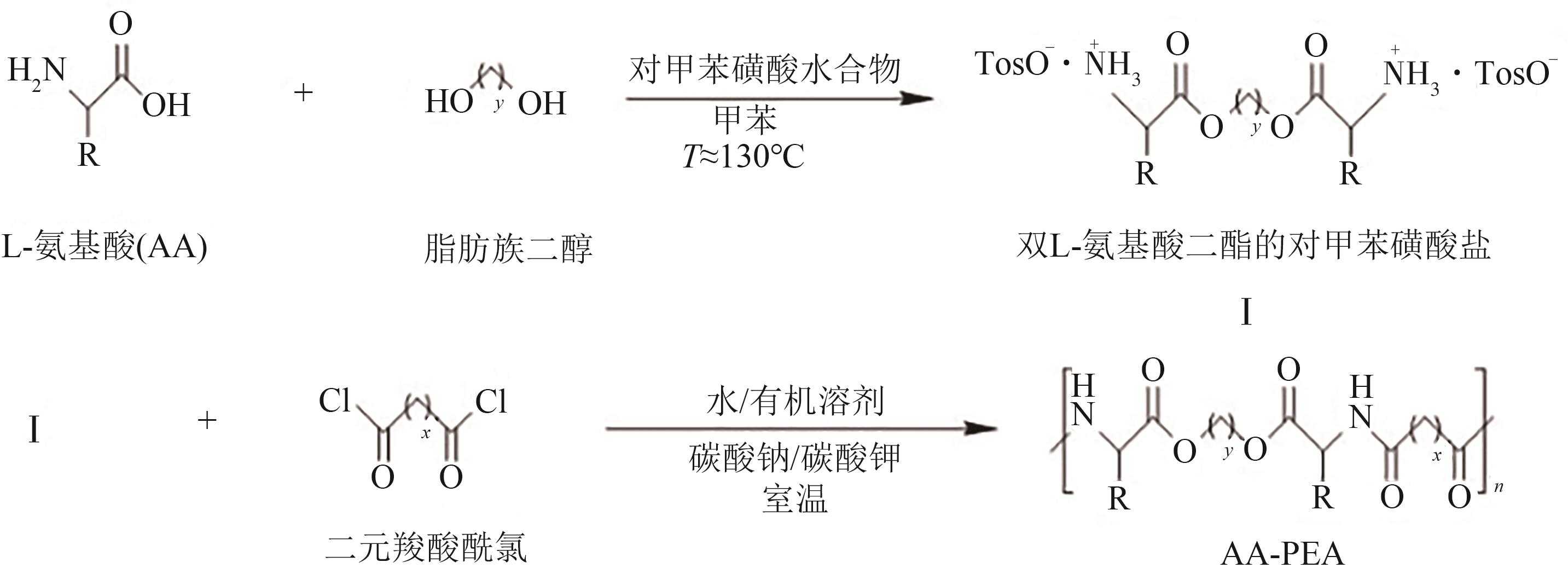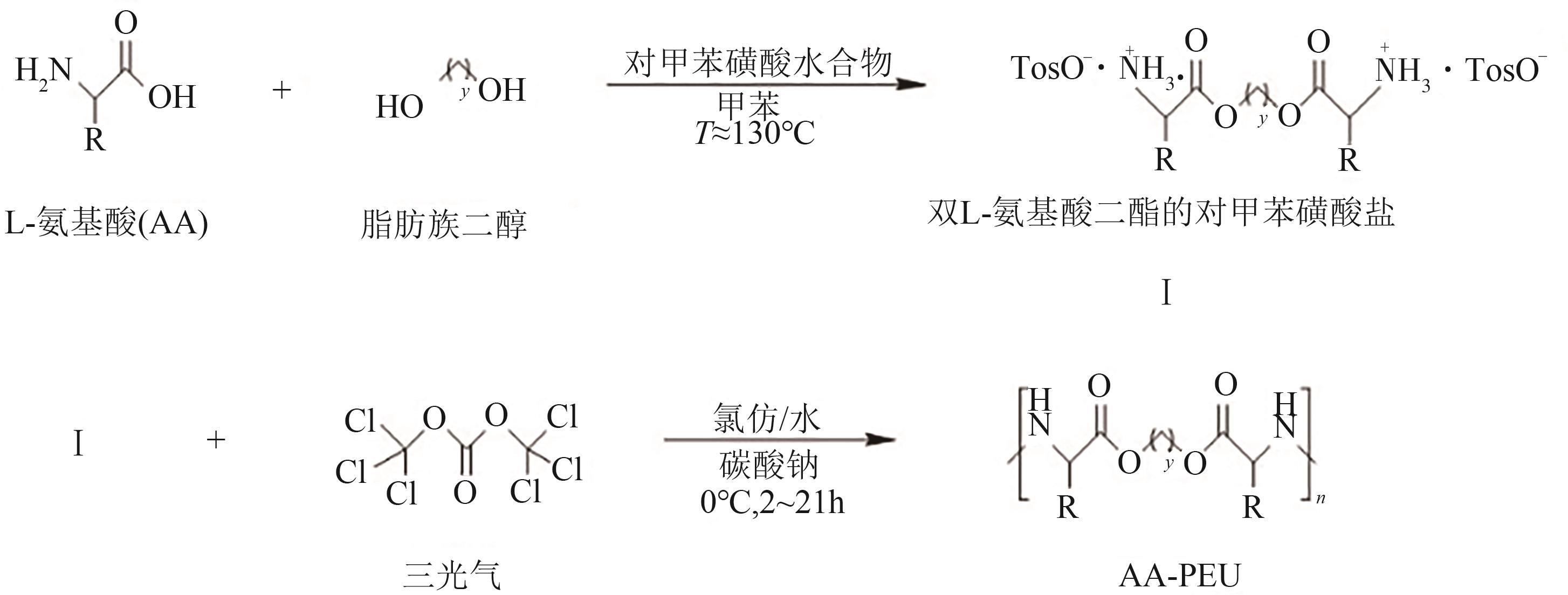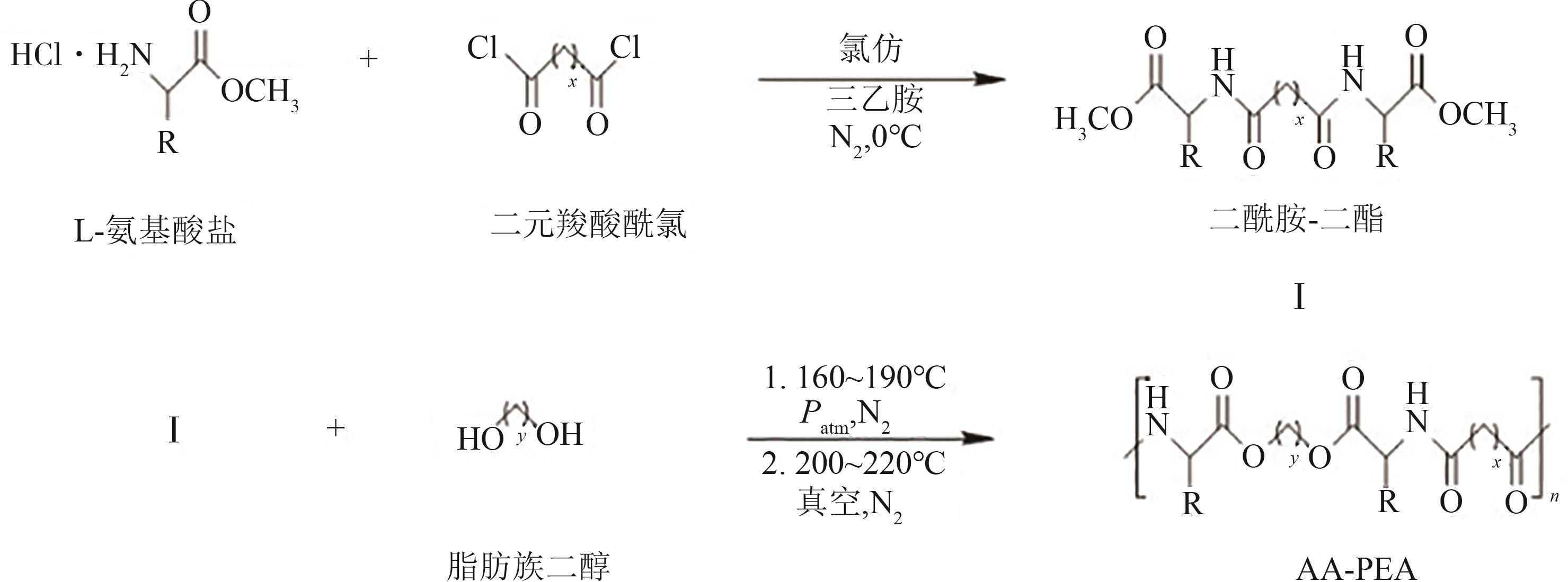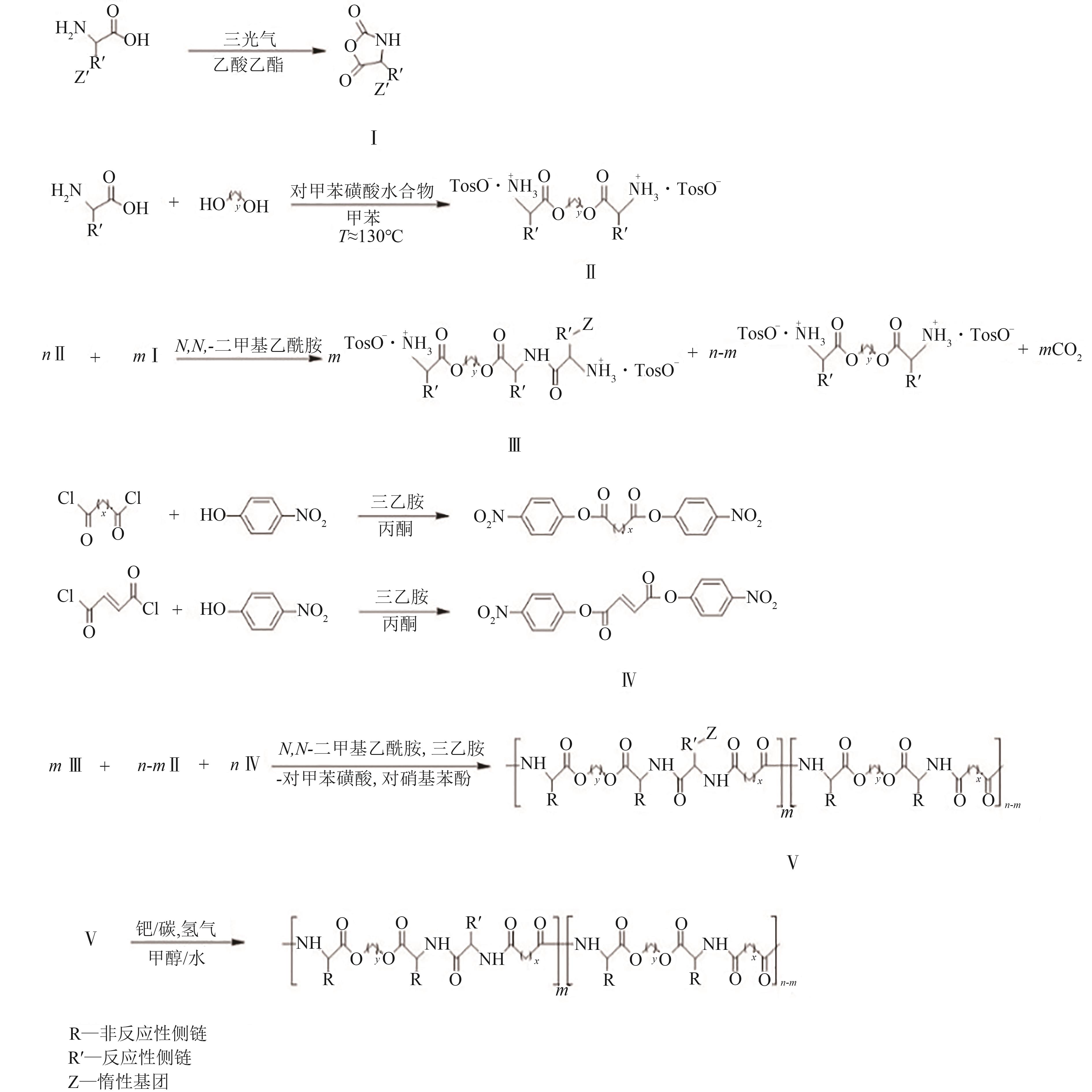Chemical Industry and Engineering Progress ›› 2024, Vol. 43 ›› Issue (4): 2001-2016.DOI: 10.16085/j.issn.1000-6613.2023-0626
• Biochemical and pharmaceutical engineering • Previous Articles
Pseudo-protein biomaterials: Classification, synthesis and application
XUE Yunjiao1( ), ZHANG Xuan1, LIU Yang1, CHEN Yuhuan1, FANG Jing2(
), ZHANG Xuan1, LIU Yang1, CHEN Yuhuan1, FANG Jing2( ), YANG Fang1(
), YANG Fang1( )
)
- 1.College of Chemical Engineering and Technology, Hebei University of Technology, Tianjin 300130, China
2.Tianjin Vocational College of Bioengineering, Tianjin 300462, China
-
Received:2023-04-18Revised:2023-07-28Online:2024-05-13Published:2024-04-15 -
Contact:FANG Jing, YANG Fang
伪蛋白生物材料的分类、合成及其应用
薛云娇1( ), 张璇1, 刘洋1, 陈玉焕1, 房静2(
), 张璇1, 刘洋1, 陈玉焕1, 房静2( ), 杨芳1(
), 杨芳1( )
)
- 1.河北工业大学化工学院,天津 300130
2.天津生物工程职业技术学院,天津 300462
-
通讯作者:房静,杨芳 -
作者简介:薛云娇(1998—),女,硕士研究生,研究方向为可再生能源的开发和利用及药物载体。E-mail:xueyunjiao995202@163.com。 -
基金资助:2022年度引进留学人员资助项目(重点)(C20220502)
CLC Number:
Cite this article
XUE Yunjiao, ZHANG Xuan, LIU Yang, CHEN Yuhuan, FANG Jing, YANG Fang. Pseudo-protein biomaterials: Classification, synthesis and application[J]. Chemical Industry and Engineering Progress, 2024, 43(4): 2001-2016.
薛云娇, 张璇, 刘洋, 陈玉焕, 房静, 杨芳. 伪蛋白生物材料的分类、合成及其应用[J]. 化工进展, 2024, 43(4): 2001-2016.
share this article
Add to citation manager EndNote|Ris|BibTeX
URL: https://hgjz.cip.com.cn/EN/10.16085/j.issn.1000-6613.2023-0626
| 种类 | 组成 | 性质 |
|---|---|---|
| AA-PEA | 氨基酸、 脂肪族二醇、 脂肪族二酸 | AA-PEA含有酯键和酰胺键,聚酰胺具有良好的力学、热和加工性能,聚酯具有可生物降解性和生物相容性[ |
| AA-PEEA | 氨基酸、 聚乙二醇、 脂肪族二酸 | AA-PEEA含有酯键、酰胺键、醚键,醚键增加了聚合物链的柔韧性。PEEA比PEA在性能上具有更多优越性,如PEEA的亲水性、可生化性和溶解度均强于PEA[ |
| AA-PEU | 氨基酸、脂肪族二醇、 三光气或氨基酸、二醇、HDI 和 1,4丁二胺(BDA) | AA-PEU含有酯键和尿素键,尿素键具有很多分子间氢键,为聚合物提供了优异的热稳定性、耐化学性[ |
| 种类 | 组成 | 性质 |
|---|---|---|
| AA-PEA | 氨基酸、 脂肪族二醇、 脂肪族二酸 | AA-PEA含有酯键和酰胺键,聚酰胺具有良好的力学、热和加工性能,聚酯具有可生物降解性和生物相容性[ |
| AA-PEEA | 氨基酸、 聚乙二醇、 脂肪族二酸 | AA-PEEA含有酯键、酰胺键、醚键,醚键增加了聚合物链的柔韧性。PEEA比PEA在性能上具有更多优越性,如PEEA的亲水性、可生化性和溶解度均强于PEA[ |
| AA-PEU | 氨基酸、脂肪族二醇、 三光气或氨基酸、二醇、HDI 和 1,4丁二胺(BDA) | AA-PEU含有酯键和尿素键,尿素键具有很多分子间氢键,为聚合物提供了优异的热稳定性、耐化学性[ |
| 种类 | 组成 | 性质 |
|---|---|---|
| AA-UPEA | 氨基酸、 脂肪族二醇、 不饱和脂肪族二酸 | AA-UPEA和AA-UPEEA的不饱和碳碳双键均由不饱和的二酸或二元羧酸酰氯提供,碳碳双键增加了伪蛋白的疏水性[ |
| AA-UPEEA | 氨基酸、 聚乙二醇、 不饱和脂肪族二酸 | |
| AA-PEUU | 氨基酸、 脂肪族二醇、 HDI、GAE | AA-PEUU含有酯键、尿素键和聚氨酯(PU)键,PU具有多样性的结构和性能,被认为是生物医学领域最有前途的材料之一[ |
| 种类 | 组成 | 性质 |
|---|---|---|
| AA-UPEA | 氨基酸、 脂肪族二醇、 不饱和脂肪族二酸 | AA-UPEA和AA-UPEEA的不饱和碳碳双键均由不饱和的二酸或二元羧酸酰氯提供,碳碳双键增加了伪蛋白的疏水性[ |
| AA-UPEEA | 氨基酸、 聚乙二醇、 不饱和脂肪族二酸 | |
| AA-PEUU | 氨基酸、 脂肪族二醇、 HDI、GAE | AA-PEUU含有酯键、尿素键和聚氨酯(PU)键,PU具有多样性的结构和性能,被认为是生物医学领域最有前途的材料之一[ |
| 伪蛋白类型 | 合成方法 |
|---|---|
| 非功能性伪蛋白 | |
| AA-PEA | MP、IP、SP |
| AA-PEEA | SP |
| AA-PEU | IP、SP |
| 功能性伪蛋白 | |
AA-UPEA\\UPEEA AA-PEUU | IP、SP |
| SP | |
| 含有反应性侧链的伪蛋白 | SP、ROP |
| 伪蛋白类型 | 合成方法 |
|---|---|
| 非功能性伪蛋白 | |
| AA-PEA | MP、IP、SP |
| AA-PEEA | SP |
| AA-PEU | IP、SP |
| 功能性伪蛋白 | |
AA-UPEA\\UPEEA AA-PEUU | IP、SP |
| SP | |
| 含有反应性侧链的伪蛋白 | SP、ROP |
| 类型 | 聚合物 | 应用 | 参考文献 | 类型 | 聚合物 | 功能化 | 应用 | 参考文献 |
|---|---|---|---|---|---|---|---|---|
| 非功能性伪蛋白 | Phe-PEA、Met-PEA | 组织工程支架 | [ | 功能性伪蛋白 | Arg-UPEA | 通过碳碳双键与普朗尼克丙烯酸(Pluronic-DA)前体光交联 | 水凝胶 | [ |
| Phe-PEA | 纳米颗粒 | [ | Arg-Leu-PEUU | 自组装 | 纳米颗粒 | [ | ||
| Phe-PEA | 微球 | [ | Arg-Leu PEUU | 马来酸官能化、引入交联烯烃与聚乙二醇二甲基丙烯酸酯原位交联 | 组织工程支架 | [ | ||
| Arg-PEA | 基因载体 | [ | PEA-Ser-OH | 侧羟基丙烯化及光凝胶化 | 水凝胶 | [ | ||
| Phe-PEU | 软组织修复材料 | [ | PEA-Asp-COOH | 偶联转化生长因子(TGF-b1) | 组织工程 | [ | ||
| Val-Phe-PEU | 软组织修复材料 | [ | Lys-Arg-Phe-PEA | 自组装 | 两亲性胶束 | [ |
| 类型 | 聚合物 | 应用 | 参考文献 | 类型 | 聚合物 | 功能化 | 应用 | 参考文献 |
|---|---|---|---|---|---|---|---|---|
| 非功能性伪蛋白 | Phe-PEA、Met-PEA | 组织工程支架 | [ | 功能性伪蛋白 | Arg-UPEA | 通过碳碳双键与普朗尼克丙烯酸(Pluronic-DA)前体光交联 | 水凝胶 | [ |
| Phe-PEA | 纳米颗粒 | [ | Arg-Leu-PEUU | 自组装 | 纳米颗粒 | [ | ||
| Phe-PEA | 微球 | [ | Arg-Leu PEUU | 马来酸官能化、引入交联烯烃与聚乙二醇二甲基丙烯酸酯原位交联 | 组织工程支架 | [ | ||
| Arg-PEA | 基因载体 | [ | PEA-Ser-OH | 侧羟基丙烯化及光凝胶化 | 水凝胶 | [ | ||
| Phe-PEU | 软组织修复材料 | [ | PEA-Asp-COOH | 偶联转化生长因子(TGF-b1) | 组织工程 | [ | ||
| Val-Phe-PEU | 软组织修复材料 | [ | Lys-Arg-Phe-PEA | 自组装 | 两亲性胶束 | [ |
| 1 | ABBAS Manzar, ZOU Qianli, LI Shukun, et al. Self-assembled peptide- and protein-based nanomaterials for antitumor photodynamic and photothermal therapy[J]. Advanced Materials, 2017, 29(12): 1605021. |
| 2 | DEFRATES Kelsey G, MOORE Robert, BORGESI Julia, et al. Protein-based fiber materials in medicine: A review[J]. Nanomaterials, 2018, 8(7): 457. |
| 3 | MISAWA Nobuo, OSAKI Toshihisa, TAKEUCHI Shoji. Membrane protein-based biosensors[J]. Journal of the Royal Society, Interface, 2018, 15(141): 20170952. |
| 4 | FERRIS Cristina, VIOLANTE DE PAZ M, ZAMORA Francisca, et al. Dithiothreitol-based polyurethanes. Synthesis and degradation studies[J]. Polymer Degradation and Stability, 2010, 95(9): 1480-1487. |
| 5 | RUANO Guillem, Angélica DíAZ, TONONI Jordi, et al. Biohydrogel from unsaturated polyesteramide: Synthesis, properties and utilization as electrolytic medium for electrochemical supercapacitors[J]. Polymer Testing, 2020, 82: 106300. |
| 6 | IKADA Yoshito, TSUJI Hideto. Biodegradable polyesters for medical and ecological applications[J]. Macromolecular Rapid Communications, 2000, 21(3): 117-132. |
| 7 | HE Mingyu, POTUCK Alicia, ZHANG Yi, et al. Arginine-based polyester amide/polysaccharide hydrogels and their biological response[J]. Acta Biomaterialia, 2014, 10(6): 2482-2494. |
| 8 | HE Mingyu, POTUCK Alicia, KOHN Julie C, et al. Self-assembled cationic biodegradable nanoparticles from pH-responsive amino-acid-based poly(ester urea urethane)s and their application as a drug delivery vehicle[J]. Biomacromolecules, 2016, 17(2): 523-537. |
| 9 | CHU C C. Novel biodegradable functional amino acid-based poly(ester amide) biomaterials: Design, synthesis,property and biomedical applications[J]. Journal of Fiber Bioengineering and Informatics, 2018, 5(1): 1-31. |
| 10 | HORWITZ Joshua A, SHUM Katrina M, BODLE Josephine C, et al. Biological performance of biodegradable amino acid-based poly(ester amide)s: Endothelial cell adhesion and inflammation in vitro[J]. Journal of Biomedical Materials Research A, 2010, 95A(2): 371-380. |
| 11 | YIN Maoli, WAN Shuangshuang, REN Xuehong, et al. Development of inherently antibacterial, biodegradable, and biologically active chitosan/pseudo-protein hybrid hydrogels as biofunctional wound dressings[J]. ACS Applied Materials & Interfaces, 2021, 13(12): 14688-14699. |
| 12 | KATSARAVA R, BERIDZE V, ARABULI N, et al. Amino acid based bioanalogous polymers. Synthesis and study of regular poly (ester amide)s based on bis(a-amino acid) α, ω-alkylene diesters and aliphatic dicarboxylic acids[J]. Journal of Polymer Science A: Polymer Chemistry, 1999, 37: 391-407. |
| 13 | CHU Chih-Chang, KATSARAVA R. Elastomeric functional biodegradable copolyester amides and copolyester urethanes: US7408018[P]. 2008-08-05. |
| 14 | HE Mingyu, CHU Chih-Chang. A new family of functional biodegradable arginine-based polyester urea urethanes: Synthesis, chracterization and biodegradation[J]. Polymer, 2013, 54(16): 4112-4125. |
| 15 | WU Jun, WU Dequn, MUTSCHLER Martha A, et al. Cationic hybrid hydrogels from amino-acid-based poly(ester amide): Fabrication, characterization, and biological properties[J]. Advanced Functional Materials, 2012, 22(18): 3815-3823. |
| 16 | WU Jun, MUTSCHLER Martha A, CHU Chih-Chang. Synthesis and characterization of ionic charged water soluble arginine-based poly (ester amide) [J]. Journal of Materials Science Materials in Medicine, 2011, 22(3): 469-479. |
| 17 | DENG Mingxiao, WU Jun, REINHART-KING Cynthia A, et al. Synthesis and characterization of biodegradable poly(ester amide)s with pendant amine functional groups and in vitro cellular response[J]. Biomacromolecules, 2009, 10(11): 3037-3047. |
| 18 | GUO Kai, CHU Chih-Chang. Synthesis and characterization of poly(ε-caprolactone) containing amino acid-based poly(ether ester amide)s[J]. Journal of Applied Polymer Science, 2012, 125(1): 812-819. |
| 19 | YAO Kaili, LIU Zhanli, LI Ting, et al. Mesoscale structure-based investigation of polyurea dynamic modulus and shock-wave dissipation[J]. Polymer, 2020, 202: 122741. |
| 20 | FAN Jitang, CHEN Ang. Studying a flexible polyurethane elastomer with improved impact-resistant performance[J]. Polymers, 2019, 11(3): 467. |
| 21 | GUO Kai, CHU Chih-Chang. Copolymers of unsaturated and saturated poly(ether ester amide)s: Synthesis, characterization, and biodegradation[J]. Journal of Applied Polymer Science, 2008, 110(3): 1858-1869. |
| 22 | GUO Kai, CHU Chih-Chang. Synthesis, characterization, and biodegradation of copolymers of unsaturated and saturated poly(ester amide)s[J]. Journal of Polymer Sciencet A: Polymer Chemistry, 2007,45(9): 1595-1606. |
| 23 | GUO Kai, CHU Chih-Chang. Biodegradation of unsaturated poly(ester-amide)s and their hydrogels[J]. Biomaterials, 2007, 28(22): 3284-3294. |
| 24 | GUO Kai, CHU Chih-Chang. Controlled release of hydrophobic drugs from biodegradable unsaturated poly(ester amide)s/poly(ethylene glycol) diacrylate hydrogels[J]. Journal of Biomaterials Science, Polymer Edition, 2007, 18(5): 489-504. |
| 25 | TANG Lin, SHAO Shuren, WANG Ao, et al. Influence of fluorocarbon side chain on microphase separation and chemical stability of silicon-containing polycarbonate urethane[J]. Polymer, 2022, 242: 124538. |
| 26 | XU Cancan, HONG Yi. Rational design of biodegradable thermoplastic polyurethanes for tissue repair[J]. Bioactive Materials, 2022, 15: 250-271. |
| 27 | PANG Xuan, WU Jun, CHU Chih-Chang, et al. Development of an arginine-based cationic hydrogel platform: Synthesis, characterization and biomedical applications[J]. Acta Biomaterialia, 2014, 10(7): 3098-3107. |
| 28 | PANG Xuan, WU Jun, REINHART-KING C, et al. Synthesis and characterization of functionalized water soluble cationic poly(ester amide)s[J]. Journal of Polymer Science A: Polymer Chemistry, 2010, 48(17): 3758-3766. |
| 29 | JOKHADZE G, MACHAIDZE M, PANOSYAN H, et al. Synthesis and characterization of functional elastomeric poly(ester amide) co-polymers[J]. Biomaterials Science Polymer Edition, 2007, 18(4): 411-438. |
| 30 | PAREDES N, RODRÍGUEZ-GALÁN A, PUIGGALI J. Synthesis and characterization of a family of biodegradable poly(ester amide)s derived from glycine[J]. Journal of Polymer Science A: Polymer Chemistry, 1998, 36(8): 1271-1282. |
| 31 | ABDOLMALEKI Amir, MALLAKPOUR Shadpour, ESMAELI Ramtin Nazari, et al. Synthesis and structural characterization of novel nanostructured aromatic optically active poly(ester-amide)s derived from S-tyrosine containing symmetric diol and aromatic diacid chlorides[J]. Polymer-Plastics Technology and Engineering, 2016, 55(9): 911-919. |
| 32 | ABDOLMALEKI Amir, MALLAKPOUR Shadpour, BORANDEH Sedigheh. Effect of silane-modified ZnO on morphology and properties of bionanocomposites based on poly(ester-amide) containing tyrosine linkages[J]. Polymer Bulletin, 2012, 69: 15-28. |
| 33 | ATKINS Katelyn M, LOPEZ David, KNIGHT Darryl K, et al. A versatile approach for the syntheses of poly(ester amide)s with pendant functional groups[J]. Journal of Polymer Science A: Polymer Chemistry, 2009, 47(15): 3757-3772. |
| 34 | VERA Montserrat, FRANCO Lourdes, PUIGGALI Jordi. Synthesis of poly(ester amide)s with lateral groups from a bulk polycondensation reaction with formation of sodium chloride salts[J]. Journal of Polymer Science A: Polymer Chemistry, 2008, 46(2): 661-667. |
| 35 | Alfonso RODRIGUEZ-GALAN, FRANCO Lourdes, PUIGGALI Jordi. Degradable poly(ester amide)s for biomedical applications[J]. Polymers, 2010, 3(1): 65-99. |
| 36 | GUO Kai, CHU Chih-Chang, CHKHAIDZE E, et al. Synthesis and characterization of novel biodegradable unsaturated poly(ester amide)s[J]. Journal of Polymer Science A: Polymer Chemistry, 2005, 43(7): 1463-1477. |
| 37 | TSITLANADZE G, MACHAIDZE M, KVIRIA T, et al. Biodegradation of amino-acid-based poly(ester amide)s: In vitro weight loss and preliminary in vivo studies[J]. Journal of Biomaterials Science, Polymer Edition, 2004, 15(1): 1-24. |
| 38 | GUO Kai, CHU Chih-Chang. Synthesis of biodegradable amino-acid-based poly(ester amide)s and poly(ether ester amide)s with pendant functional groups[J]. Journal of Applied Polymer Science, 2010, 117(6): 3386-3394. |
| 39 | SONG H, CHU Chih-Chang. Synthesis and characterization of a new family of cationic amino acid-based poly(ester amide)s and their biological properties[J]. Journal of Applied Polymer Science, 2012, 124(5): 3840-3853. |
| 40 | GUO Kai, CHU Chih-Chang. Synthesis, characterization, and biodegradation of novel poly(ether ester amide)s based on l-phenylalanine and oligoethylene glycol[J]. Biomacromolecules, 2007, 8(9): 2851-2861. |
| 41 | YU Jiayi, LIN Fei, LIN Panpan, et al. Phenylalanine-based poly(ester urea): Synthesis, characterization, and in vitro degradation[J]. Macromolecules, 2014, 47(1): 121-129. |
| 42 | LI Mengna, LI Na, QIU Weiwang, et al. Phenylalanine-based poly(ester urea)s composite films with nitric oxide-releasing capability for anti-biofilm and infected wound healing applications[J]. Journal of Colloid and Interface Science, 2022, 607: 1849-1863. |
| 43 | PANG Xuan, CHU Chih-Chang. Synthesis, characterization and biodegradation of functionalized amino acid-based poly(ester amide)s[J]. Biomaterials 2010, 31(14): 3745-3754. |
| 44 | HE Mingyu, Lillian RO, LIU Jing, et al. Folate-decorated arginine-based poly(ester urea urethane) nanoparticles as carriers for gambogic acid and effect on cancer cells[J]. Journal of Biomedical Materials Research A, 2017, 105(2): 475-490. |
| 45 | DE WIT Matthew A, WANG Zixi, ATKINS Katelyn M, et al. Syntheses, characterization, and functionalization of poly(ester amide)s with pendant amine functional groups[J]. Journal of Polymer Science A: Polymer Chemistry, 2008, 46(19): 6376-6392. |
| 46 | HE Pan, TANG Zhaohui, LIN Lin, et al. Novel biodegradable and pH-sensitive poly(ester amide) microspheres for oral insulin delivery[J]. Macromolecular Bioscience, 2012, 12(4): 547-556. |
| 47 | ODIAN G. Principles of polymerization[M]. New Jersey: John Wiley & Sons Inc, 2004: 832. |
| 48 | WITTBECKER Emerson L, MORGAN Paul W. Interfacial polycondensation. Ⅰ. The formation of surface graft polymers on wool [J]. Journal of Polymer Science, 1959, 40(137): 289-297. |
| 49 | MORGAN Paul W, KWOLEK Stephanie L. Interfacial polycondensation: Ⅱ. Fundamentals of polymer formation at liquid interfaces[J]. Journal of Polymer Science, 1959, 40(137): 299–327. |
| 50 | KARIMI Pooneh, RIZKALLA Amin S, MEQUANINT Kibret. Versatile biodegradable poly(ester amide)s derived from α-amino acids for vascular tissue engineering[J]. Materials, 2010, 3(4): 2346-2368. |
| 51 | NATARAJAN Janeni, CHATTERJEE Kaushik, MADRAS Giridhar. Tailored degradation and dye released from poly(ester amides)[J]. Polymer-Plastics Technology and Engineering, 2017, 56(6): 635-646. |
| 52 | AL-TAYYEM Ban H, SWEILEH Bassam A. Synthesis, characterization and hydrolytic degradation of novel biodegradable poly(ester amide)s derived from Isosorbide and α-amino acids[J]. Journal of Polymer Research, 2020, 27: 120. |
| 53 | GAO Yaohua, CHILDERS Erin P, BECKER Matthew L. L-leucine-based poly(ester urea)s for vascular tissue engineering[J]. ACS Biomaterials Science & Engineering, 2015, 1(19): 795-804. |
| 54 | PETERSON Gregory I, CHILDERS Erin P, LI Hao, et al. Tunable shape memory polymers from α-amino acid-based poly(ester urea)s[J]. Macromolecules, 2017, 50(11): 4300-4308. |
| 55 | DREGER Nathan Z, FAN Zhaobo, ZANDER Zachary K, et al. Amino acid-based poly(ester urea) copolymer films for hernia-repair applications[J]. Biomaterials, 2018, 182: 44-57. |
| 56 | POLICASTRO Gina M, LIN Fei, SMITH CALLAHAN Laura A, et al. OGP functionalized phenylalanine-based poly(ester urea) for enhancing osteoinductive potential of human mesenchymal stem cells[J]. Biomacromolecules, 2015, 16(4): 1358-1371. |
| 57 | DE JONGH Patrick A J M, PAUL Prem K C, KHOSHDEL Ezat, et al. High Tg poly(ester amide)s by melt polycondensation of monomers from renewable resources; citric acid, D-glucono-δ-lactone and amino acids: A DSC study[J]. European Polymer Journal, 2017, 94: 11-19. |
| 58 | ASÍN L, ARMELIN E, MONTANÉ J, et al. Sequential poly(ester amide)s based on glycine, diols, and dicarboxylic acids: Thermal polyesterification versus interfacial polyamidation. Characterization of polymers containing stiff units[J]. Journal of Polymer Science A: Polymer Chemistry, 2001, 39(24): 4283-4293. |
| 59 | ABBES Marwa, SALHI Slim, LEFEVRE Lénaïg, et al. Poly(ester-amide)s derived from adipic acid, 1,4-butanediol and β-alanine[J]. Journal of Macromolecular Science A, 2015, 52(1): 56-63. |
| 60 | GUPTA Sachchidanand Soaham, MISHRA Vivek, MUKHERJEE Maumita Das, et al. Amino acid derived biopolymers: Recent advances and biomedical applications[J]. International Journal of Biological Macromolecules, 2021, 188: 542-567. |
| 61 | SUN Huanli, MENG Fenghua, DIAS Aylvin A, et al. α-Amino acid containing degradable polymers as functional biomaterials: Rational design, synthetic pathway, and biomedical applications[J]. Biomacromolecules, 2011, 12(6): 1937-1955. |
| 62 | IN’T VELD Peter J A, DIJKSTRA Pieter J, FEIJEN Jan. Synthesis of biodegradable polyesteramides with pendant functional groups[J]. Die Macromolekulare Chemie, 1992, 193(11): 2713-2730. |
| 63 | DENG Mingxiao, WU Jun, REINHART-KING Cynthia A, et al. Biodegradable functional poly(ester amide)s with pendant hydroxyl functional groups: Synthesis, characterization, fabrication and in vitro cellular response[J]. Acta Biomaterialia, 2011, 7(4): 1504-1515. |
| 64 | KNIGHT Darryl K, GILLIES Elizabeth R, MEQUANINT Kibret. Biomimetic L-aspartic acid-derived functional poly(ester amide)s for vascular tissue engineering[J]. Acta Biomaterialia, 2014, 10(8): 3484-3496. |
| 65 | VILLAMAGNA Ian J, GORDON Trent N, HURTIG Mark B, et al. Poly(ester amide) particles for controlled delivery of celecoxib[J]. Journal of Biomedical Materials Research A, 2019, 107(6):1235-1243. |
| 66 | GUO Kai, CHU Chih-Chang. Biodegradable and injectable paclitaxel-loaded poly(ester amide)s microspheres: Fabrication and characterization[J]. Journal of Biomedical Materials Research B: Applied Biomaterials, 2009, 89: 491-500. |
| 67 | MEMANISHVILI Tamar, ZAVRADASHVILI Nino, KUPATADZE Nino, et al. Arginine-based biodegradable ether-ester polymers with low cytotoxicity as potential gene carriers[J]. Biomacromolecules, 2014, 15(8): 2839-2848. |
| 68 | LIU Jing, WANG Pei, CHU Chih-Chang, et al. Arginine-leucine based poly (ester urea urethane) coating for Mg-Zn-Y-Nd alloy in cardiovascular stent applications[J]. Colloids and Surfaces B: Biointerfaces, 2017, 159(1): 78-88. |
| 69 | CAO Kai, FLEGG Derek S, LIN Shigang, et al. Fabrication and in situ cross-linking of carboxylic-acid-functionalized poly(ester amide) scaffolds for tissue engineering[J]. ACS Applied Polymer Materials, 2019, 1(9): 2360-2369. |
| 70 | JI Ying, SHAN Shuo, HE Mingyu, et al. A novel pseudo-protein-based biodegradable nanomicellar platform for the delivery of anticancer drugs[J]. Small, 2017, 13(1): 1601491. |
| 71 | ZHU Jie, HAN Hua, LI Faxue, et al. Self-assembly of amino acid-based random copolymers for antibacterial application and infection treatment as nanocarriers[J]. Journal of Colloid and Interface Science, 2019, 540: 634-646. |
| 72 | LANE D D, SU F Y, CHIU D Y, et al. Dynamic intracellular delivery of antibiotics via pH-responsive polymersomes[J]. Polymer Chemistry, 2015, 6(8): 1255-1266. |
| 73 | SADEGHI Ilin, KRONENBERG Jacob, ASATEKIN Ayse. Selective transport through membranes with charged nanochannels formed by scalable self-assembly of random copolymer micelles[J]. ACS Nano, 2018,12(1): 95-108. |
| 74 | KWAN Hiu Yee, XU Qinghua, GONG Ruihong, et al. Targeted Chinese medicine delivery by a new family of biodegradable pseudo-protein nanoparticles for treating triple-negative breast cancer: In vitro and in vivo study[J]. Frontiers in Oncology, 2020, 10: 600298. |
| 75 | JI Ying, ZHAO Jihui, CHU Chih-Chang. Biodegradable nanocomplex from hyaluronic acid and arginine based poly(ester amide)s as the delivery vehicles for improved photodynamic therapy of multidrug resistant tumor cells[J]. Journal of Biomedical Materials Research A, 2017, 105(5): 1487-1499. |
| 76 | YU Jianling, YANG Fang, LIU Zhihua, et al. Preparation and characterization of C10-C14 alkyl cellulose ester sulfate surfactant[J]. Journal of Surfactants and Detergents, 2014, 17(4): 647-653. |
| 77 | YANG Fang, LIU Yanan, YU Jianling, et al. Synthesis, micellization behavior and alcohol induced amphipathic cellulose film of cellulose-based amphiphilic surfactant[J]. Applied Surface Science, 2015, 345(1): 187-193. |
| 78 | YANG Fang, HAN Huaxin, FAN Hongxian, et al. Synthesis, characterization, and in vitro release analysis of a novel glucan based polymer carrier[J]. Colloid and Polymer Science, 2018, 296(8): 1401-1407. |
| 79 | YANG Fang, XIAO Dan, HAN Huaxin, et al. Amphiphilic polymeric micelles originating from 1,4,β,D-glucan-g-polyphenylene oxide as the carriers for delivery of docetaxel and the corresponding release behaviors[J]. International Journal of Biological Macromolecules, 2018, 114: 194-203. |
| 80 | WU Dequn, WU Jun, CHU Chih-Chang. A novel family of biodegradable hybrid hydrogels from arginine-based poly(ester amide) and hyaluronic acid precursors[J]. Soft Matter, 2013, 9(15): 3965-3975. |
| 81 | HOFFMAN A S. Hydrogels for biomedical applications[J]. Advanced Drug Delivery Reviews, 2012, 64: 18-23. |
| 82 | HERNANDEZ-GONZALEZ Aurora C, Lucía TELLEZ-JURADO, RODRIGUEZ-LORENZO Luis M. Alginate hydrogels for bone tissue engineering, from injectables to bioprinting: A review[J]. Carbohydrate Polymers, 2019, 229: 115514. |
| 83 | YANG Jun, SHEN Mingyue, WEN Huiliang, et al. Recent advance in delivery system and tissue engineering applications of chondroitin sulfate[J]. Carbohydrate Polymers, 2020, 230: 115650. |
| 84 | ZHANG S H, XIN P K, OU Q M, et al. Poly(ester amide)-based hybrid hydrogels for efficient transdermal insulin delivery[J]. Journal of Materials Chemistry B, 2018, 6(42): 6723-6730. |
| 85 | SINHA V R, TREHAN A. Biodegradable microspheres for parenteral delivery[J]. Critical Reviews In Therapeutic Drug Carrier Systems, 2005, 22(6): 535-602. |
| 86 | TAMBER H, JOHANSEN P, MERKLE H P, et al. Formulation aspects of biodegradable polymeric microspheres for antigen delivery[J]. Advanced Drug Delivery Reviews, 2005, 57(3): 357-376 |
| 87 | NALDINI Luigi. Gene therapy returns to centre stage[J]. Nature, 2015, 526 (7573): 351-360. |
| 88 | SCHAFFERT D, WAGNER E. Gene therapy progress and prospects: Synthetic polymer-based systems[J]. Gene Therapy, 2008, 15 (16): 1131-1138. |
| 89 | YOU Xinru, GU Zhipeng, HUANG Jun, et al. Arginine-based poly(ester amide) nanoparticle platform: From structure-property relationship to nucleic acid delivery[J]. Acta Biomaterialia, 2018, 74:180-191. |
| 90 | DIAZ Angélica, DEL VALLE Luis J, TUGUSHI David, et al. New poly(ester urea) derived from L-leucine: Electrospun scaffolds loaded with antibacterial drugs and enzymes[J]. Materials Science & Engineering C, 2015, 46: 450-462. |
| 91 | SADAVA Emmanuel E, KRPATA David M, GAO Yue, et al. Wound healing process and mediators: Implications for modulations for hernia repair and mesh integration[J]. Journal of Biomedical Materials Research A, 2014, 102(1): 295-302. |
| 92 | ZHU Leiming, SCHUSTER Philipp, KLINGE Uwe. Mesh implants: An overview of crucial mesh parameters[J]. World Journal of Gastrointestinal Surgery, 2015, 7(10): 226-236. |
| 93 | DREGER Nathan Z, WANDEL Mary B, ROBINSON Lindsay L, et al. Preclinical in vitro and in vivo assessment of linear and branched L-valine-based poly(ester urea)s for soft tissue applications[J]. ACS Biomaterials Science & Engineering, 2018, 4(4): 1346-1356. |
| 94 | WITTE Frank. The history of biodegradable magnesium implants: A review[J]. Acta Biomaterialia, 2010, 6(5): 1680-1692. |
| 95 | WITTE Frank, HORT Norbert, VOGT Carla, et al. Degradable biomaterials based on magnesium corrosion[J]. Current Opinion in Solid State and Materials Science, 2008, 12(5/6): 63-72. |
| 96 | WANG Juan, HE Yonghui, MAITZ Manfred F, et al. A surface-eroding poly(1,3-trimethylene carbonate) coating for fully biodegradable magnesium-based stent applications: Toward better biofunction, biodegradation and biocompatibility[J]. Acta Biomaterialia, 2013, 9(10): 8678-8689. |
| 97 | LIU J, LIU X L, XI T F, et al. A novel pseudo-protein-based biodegradable coating for magnesium substrate: in vitro corrosion phenomena and cytocompatibility[J]. Journal of Materials Chemistry B, 2015, 3(5): 878-893. |
| 98 | WENDELS Sophie, AVEROUS Luc. Biobased polyurethanes for biomedical applications[J]. Bioactive Materials, 2021, 6(4): 1083-1106. |
| 99 | EMING Sabine A, WYNN Thomas A, MARTIN Paul. Inflammation and metabolism in tissue repair and regeneration[J]. Science, 2017, 356(6342): 1026-1030. |
| 100 | LU Lan, HU Wei, TIAN Zeru, et al. Developing natural products as potential anti-biofilm agents[J]. Chinese Medicine, 2019, 14(1): 11. |
| 101 | VERDEROSA Anthony D, TOTSIKA Makrina, Makrina FAIRFULL-SMITH. Bacterial biofilm eradication agents: A current review[J]. Frontiers in Chemistry, 2019, 7: 824. |
| 102 | ABEL Alexandra K, DREGER Nathan Z, NETTLETON Karissa, et al. Amino acid-based poly(ester urea)s as a matrix for extended release of entecavir[J]. Biomacromolecules, 2020, 21(2): 946-954. |
| 103 | BRIGHAM Natasha C, NOFSINGER Rebecca, LUO Xin, et al. Controlled release of etoricoxib from poly(ester urea) films for post-operative pain management[J]. Journal of Controlled Release, 2021, 329: 316-327. |
| 104 | LI Mengna, QIU Weiwang, WANG Qian, et al. Nitric oxide-releasing tryptophan-based poly(ester urea)s electrospun composite nanofiber mats with antibacterial and antibiofilm activities for infected wound healing[J]. ACS Applied Materials & Interfaces, 2022, 14(14): 15911-15926. |
| [1] | LIU Ruolu, TANG Haibo, HE Feifei, LUO Fengying, WANG Jinge, YANG Na, LI Hongwei, ZHANG Ruiming. Recent research and prospect of liquid organic hydrogen carries technology [J]. Chemical Industry and Engineering Progress, 2024, 43(4): 1731-1741. |
| [2] | LIANG Yanyan, ZHANG Junliang, GUO Yunya, ZHANG Yanting. The role of seed in the synthesis of molecular sieves [J]. Chemical Industry and Engineering Progress, 2024, 43(3): 1275-1292. |
| [3] | WANG Xiong, KANG Wenqian, REN Yue, QIAO Tongsen, ZHANG Peng, HUANG Anping, LI Guangquan. Pilot scale production of porous organic polymers and their application in polyolefin catalysts [J]. Chemical Industry and Engineering Progress, 2024, 43(3): 1412-1417. |
| [4] | YAN Shoucheng, ZHANG Huihua, XU Qianqian, WANG Yukun. Application of graphene composite supported catalyst in the removal of NO from diesel exhaust [J]. Chemical Industry and Engineering Progress, 2024, 43(3): 1456-1465. |
| [5] | WANG Kai, LUO Mingliang, LI Mingzhong, HUANG Feifei, PU Chunsheng, PU Jingyang, FAN Qiao. Research progress of polyethyleneimine crosslinked polymer gel system in water-drive reservoirs [J]. Chemical Industry and Engineering Progress, 2024, 43(3): 1506-1523. |
| [6] | GAI Hongwei, ZHANG Chenjun, QU Jingying, SUN Huailu, TUO Yongxiao, WANG Bin, JIN Xu, ZHANG Xi, FENG Xiang, CHEN De. Research progress on catalytic dehydrogenation process intensification for liquid organic hydride carrier hydrogen storage [J]. Chemical Industry and Engineering Progress, 2024, 43(1): 164-185. |
| [7] | ZHANG Jiahao, LI Yingying, XU Yanlin, YIN Jiabin, ZHANG Jisong. Research advancement of continuous reductive amination in microreactors [J]. Chemical Industry and Engineering Progress, 2024, 43(1): 186-197. |
| [8] | HENG Linyu, DENG Zhuoran, CHENG Daojian, WEI Bin, ZHAO Liqiang. Progress of high-throughput synthesis device for process reinforcement of metal catalyst preparation [J]. Chemical Industry and Engineering Progress, 2024, 43(1): 246-259. |
| [9] | YU Xiaoxiao, CHAO Yanhong, LIU Haiyan, ZHU Wenshuai, LIU Zhichang. Enhanced photoelectric properties and photocatalytic CO2 conversion by D-A conjugated polymerization [J]. Chemical Industry and Engineering Progress, 2024, 43(1): 292-301. |
| [10] | ZENG Yue, WANG Yue, ZHANG Xuerui, SONG Xiwen, XIA Bowen, CHEN Ziqi. Research progress of green ammonia synthesis from renewable energy and economic analysis of hydrogen-ammonia storage and transportation [J]. Chemical Industry and Engineering Progress, 2024, 43(1): 376-389. |
| [11] | LI Guizhen, HU Yingyuan, ZHANG Bo, YANG Yaozu, ZHAI Rongjia, ZHAO Xin. Synthesis and properties of a Rhodamine lactam-based polymeric pH fluorescent probe [J]. Chemical Industry and Engineering Progress, 2024, 43(1): 473-479. |
| [12] | SUN Yue, WANG Sijia, WU Mingxia, SONG Xianyu, XU Shouhong. Synthesis, performance regulation and application of pH/temperature responsive polymer PMAA-b-PDMAEMA [J]. Chemical Industry and Engineering Progress, 2024, 43(1): 480-489. |
| [13] | SHI Yongxing, LIN Gang, SUN Xiaohang, JIANG Weigeng, QIAO Dawei, YAN Binhang. Research progress on active sites in Cu-based catalysts for CO2 hydrogenation to methanol [J]. Chemical Industry and Engineering Progress, 2023, 42(S1): 287-298. |
| [14] | ZHAO Wei, ZHAO Deyin, LI Shihan, LIU Hongda, SUN Jin, GUO Yanqiu. Synthesis and application of triazine drag reducing agent for nature gas pipeline [J]. Chemical Industry and Engineering Progress, 2023, 42(S1): 391-399. |
| [15] | WANG Zhengkun, LI Sifang. Green synthesis of gemini surfactant decyne diol [J]. Chemical Industry and Engineering Progress, 2023, 42(S1): 400-410. |
| Viewed | ||||||
|
Full text |
|
|||||
|
Abstract |
|
|||||
